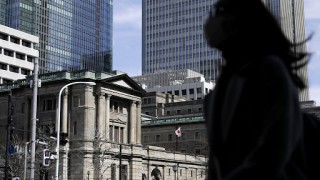Loading
Search
▼ Bank Of Japan Ploughs Deeper Into Stocks To Ease Coronavirus Fears
- Category:Other
The Bank of Japan took its controversial equity-buying programme deeper into uncharted territory on Monday, doubling its annual purchasing target to ¥12tn ($112bn) while also rolling out a new lending facility, in an attempt to match the shock value of the US Federal Reserve’s interest rate cut at the weekend.
Analysts said the moves could provide some stability to markets but may not be enough to blunt the economic effects of the coronavirus shock. Critics also argued that the measures exposed a shortage of options left to a bank that has long been pursuing ultra-loose monetary policy, holding rates at zero or below for about a decade.
The decision “indicates that the BoJ has effectively reached the limit of monetary accommodation”, Citigroup economists Katsuhiko Aiba and Kiichi Murashima said in a note to clients. The package represented Japan’s contribution to a co-ordinated central bank response to the market turmoil that has gripped all asset classes as the coronavirus outbreak has spread. The decision came with a pledge to provide ample yen funds and continue buying Japanese government bonds, and followed an emergency meeting that the BoJ brought forward by two days.
The BoJ opted not to lower interest rates further into negative territory, but its governor, Haruhiko Kuroda, signalled that more cuts were an option. He stressed that for now, the priority was to provide smooth corporate financing and stability to financial markets. The benchmark Topix index slipped after the bank’s announcement, closing down 2 per cent.
The BoJ has been buying exchange traded funds for almost 10 years to stabilise the market, lower the risk premium and encourage investment. The new upper limit gives the BoJ the scope but not the obligation to buy twice its current target amount. The increase puts the central bank on a possible course to overtake the Japanese state pension fund, the GPIF, as the biggest holder of domestic stocks by the end of the calendar year.
By then its portfolio of ETFs could exceed ¥40tn ($372bn). But traders noted that the BoJ was conspicuous by its absence from the market on Monday, buying only ¥2.7bn of real estate investment trusts and ETFs and breaking its traditional pattern of buying big in the afternoon sessions when the market has dropped more than 0.5 per cent in the morning. So far in March, the central bank has bought a little over ¥600bn of ETFs, about 80 per cent of which track the Topix index.
To help companies cope with the pandemic, the BoJ also said it would set up a new one-year facility that would offer loans against corporate debt as collateral at a zero per cent interest rate. It also increased the upper limit for its purchases of commercial paper and corporate bonds by ¥2tn.
Mr Kuroda said the current turmoil differed from the 2008 Lehman crisis, which stemmed from troubles with financial institutions, but he warned that there was high uncertainty about the depth of the virus’s impact on the global economy.
Shortly after the BoJ decision, Japanese prime minister Shinzo Abe described it as “swift and appropriate”, in light of the market turmoil around the world. Despite the eye-catching increase in the bank’s equity purchase target, some economists said it would not make a significant impact.
Marcel Thieliant, a Japan economist at Capital Economics, said that Monday’s measures “lack teeth” and that the BoJ would be forced into eventually lowering its short-term policy rate.
Others suggested the BoJ had held off from cutting rates since the US dollar had not weakened to the ¥100 mark, which would put pressure on Japan’s export-dependent businesses. On Monday it was trading around ¥105, little changed over five days.
“The BoJ may have preserved the option for a cut in interest rates to prepare for what could be a long battle,” said Takahide Kiuchi, executive economist at Nomura Research Institute and a former policy board member of the BoJ.
Masamichi Adachi, Japan economist at UBS, said he was sceptical that the BoJ’s move would produce any economic boost, but warned that when considering the likely effects on markets and the economy, the focus should be on what would have happened without it.
“This was an emergency backstop by the lender of last resort,” he said. “It is about turning a big negative into a smaller negative. If they had not done this, the situation would have been much worse.”
- March 17, 2020
- Comment (2)
- Trackback(0)
Comment(s) Write comment
how to use tinder , browse tinder for free
[url="http://tinderdatingsiteus.com/?"]tinder app [/url]
[url="http://tinderdatingsiteus.com/?"]tinder app [/url]
-
Tinder dating site Web Site
- January 30, 2021



[url="http://tinderdatingsiteus.com/?"]tinder date [/url]
CharlesRag Web Site- February 18, 2021